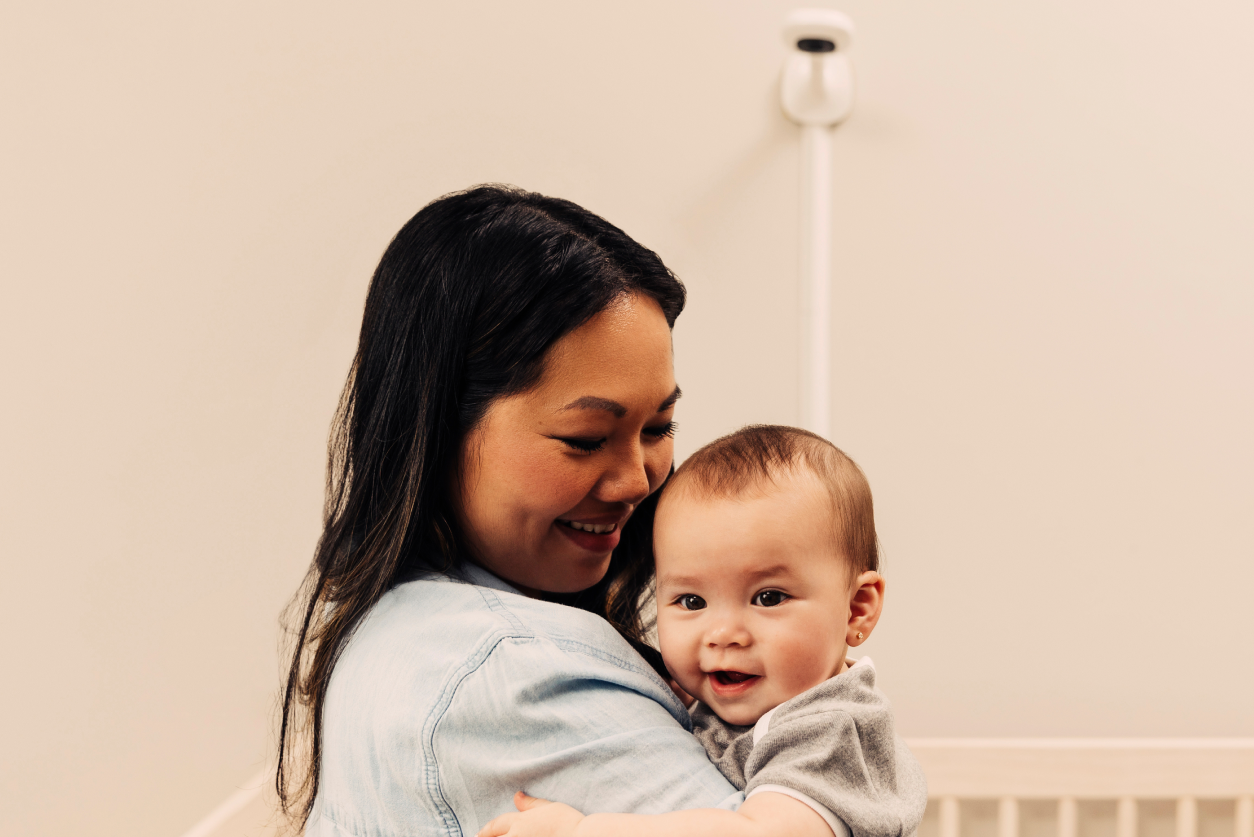How’s everyone doing? In honor of World Mental Health Day on October 10, now seems like an excellent time to check in with yourself and other parents you care about, especially those navigating the challenges of maternal mental health. There’s a lot to love about the job of raising a new baby, but the effort, energy, and care we pour into the job can also feel overwhelming. And it’s essential that we take care of ourselves with the same dedication that we take care of our little ones. So in order to help you along, here are some important things to be aware of, as well as expert advice to see you through the ups and downs.
When is the overwhelm something to worry about?
It is a universally accepted truth that after you have a baby, there’s a lot to deal with. It would be hard to find a parent out there who would call the post-baby world order easy. But for some, mental health problems can make these challenges may feel more difficult, even impossible, to overcome.
Perinatal mood and anxiety disorders (also called PMADs) affect both women and men. They can be caused by a variety of factors including:
- A history of depression or anxiety
- A lack of support from family and friends
- Stressful life events during pregnancy or after childbirth
- Hormonal changes
- Sleep deprivation
And PMADs may be more prevalent than you realized. A 2023 Nanit study found that 45 percent of mothers and 21 percent of fathers reported experiencing symptoms of depression or anxiety. The study also found that mothers are more easily able to recognize PMAD symptoms than dads; a startling 65 percent of dads were unaware that their feelings could be categorized as PMADs. Postpartum depression is the most common PMAD disorder.
How can you tell if you’re affected? Postpartum depression symptoms can include:
- Persistent sadness or anxiety
- Loss of interest in hobbies or activities you used to enjoy
- Trouble sleeping or sleeping too much
- Difficulty bonding with your baby
- Feeling disconnected from your partner or family
- Intense irritability or anger
- Feeling hopeless, worthless, or guilty
- Thoughts of harming yourself or your baby
If you think you or someone you care about might be experiencing anxiety, depression, or another mental health condition—connect with a trusted healthcare provider. They’ll be able to help you evaluate the situation and come up with a care plan. It’s important to remember that this journey is not one you have to do on your own.
When you take care of yourself, you feel better—physically and mentally.
Along with being aware of warning signs, the fourth trimester is also an incredibly important time to prioritize your own self care, with a focus on perinatal mental health. Some of our favorite Nanit experts offer this excellent advice:
Make a postpartum plan.
Even before your baby arrives, you can start putting a plan in place to support your family and prepare for those early days, when postpartum blues may arise. Are there friends or family who can come over for an afternoon to let you take a nap? Can you fill your freezer with your favorite meals? Can you line up delivery services for groceries or laundry? Be specific and let people know how they can support you best. Whatever will ease those early days and months—and give you time to rest and recover—is well worth it.
Another important element of the support village is people you can talk to when you’re feeling low, whether that’s a therapist, a group of new mom friends, or the Nanit Community. These networks may end up being a boost for you for years to come, so it’s wonderful to establish them early. “You have to prioritize yourself. Postpartum anxiety and depression are real,” says Anushay Hossain, women’s health advocate and author of The Pain Gap. “Your health is not an inconvenience and that includes your mental health.”
Know that things will get easier and try not to compare yourself to others.
Especially in the newborn stage, the confusion, exhaustion, and even baby blues, can feel constant. “You're looking everywhere for advice and suggestions, for people to validate what's going on for you,” says Latham Thomas, doula, wellness leader, and founder of Mama Glow. “And so often we see people lose their sense of self. So much of what we do at Mama Glow in the early postpartum period is to build that self-trust, build up the muscles around self advocacy.” So know that over time you—and your baby—will learn your rhythms and your ways. Also, “Be real!” says Hossain. “Talk to your mom friends and ask them what they wish they had known.” And instead of zooming out to the big picture, focus on working through the day or the moment at hand.
Don’t expect to feel like yourself right away.
During pregnancy, “your whole body has changed,” says Lexi Burtman, a physical therapist specializing in pelvic floor work, “And then delivery is a massive undertaking. So really acknowledge and give yourself some grace that you won't jump back into your old self right away and you need to treat your body gently.” Ask for help, rest, and respect what you need for your mental health. Take full advantage of any paid leave you and your partner may have available.
Work on building back strength.
Gentle exercise is a wonderful way to support your mental and physical health. Take the baby out for a walk. Do a little stretching before bed. “Get pelvic floor physical therapy!” recommends Burtman. “Even just one visit can be great to go through how your body has changed, how things feel, and what your goals are.”
Do whatever you can to get good sleep.
That may feel like an impossible hurdle in the first few months of being a parent. But sleep is critical to physical and mental well being. Nanit research found that among parents who noticed symptoms of anxiety and depression, sleep problems were reported as the most common. So strategize with your partner how you can both get more sleep. You may want to set up shifts so you can each get larger uninterrupted blocks of sleep. Nanit can be an incredible assist in this as well with the tracking tools and technology to provide parents the peace of mind they need to rest.
In fact, research has shown that Nanit parents get an extra 36 nights of sleep per year, and 71 percent of Nanit families report feeling less anxious. Also, 94 percent of Nanit parents say they sleep better and in families who use Nanit monitors, babies sleep 10 percent longer per night and fall asleep earlier.
The best way to take care of your baby may be to take a few moments for yourself.
The baby’s been crying and crying and you’re starting to feel overwhelmed or even notice anxiety symptoms creeping in. “You can't control your baby's fussiness, but you can choose how you respond to it,” says clinical psychologist Dr. Tracy Dalgleish. If you feel yourself starting to get frustrated, “gently let your baby know that you are going to put them in their crib (or another safe spot) for two minutes while you splash cold water on your face,” suggests Dr. Dalgleish. “Or practice taking five slow, deep breaths and pushing your feet into the ground. It can also be helpful to remind yourself that thoughts and feelings are not truths. They do not make you a bad parent.”
Look for little ways to refill your cup.
It can be tricky to find enough time to go get a massage or take a yoga class. But if you aim small—like super small—it’s not so hard to find ways to work joy into your every day. Look for something you can do for 15 minutes (or for 5 minutes a few times a day) that makes you happy. Is it sitting on your front porch with a cup of tea? Watching a video that makes you laugh? Putting on your favorite song while you cook dinner? Those bits of good feeling have ways of lifting your mental health up when you most need it.
Above all, know that you’re too important to the world to not take yourself—and your care—seriously. So, lean into your support systems, know when to ask for help, do whatever you can to get a little more sleep (Nanit can help!), and let in some joy, even if it’s just two minutes to do Connections. Because after all, connections matter.
Happy World Mental Health Day.








































